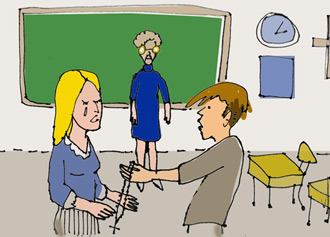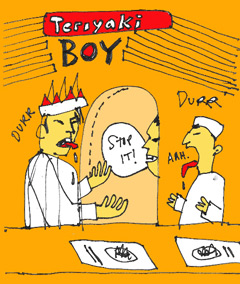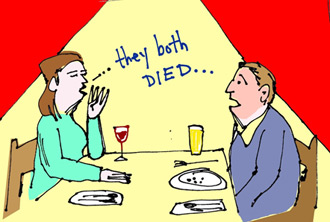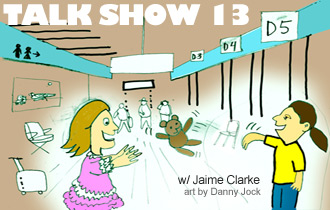Talk Show 13: with Kiara Brinkman, Bret Anthony Johnston, Fiona Maazel & Margo Rabb
13.05.08
Kiara Brinkman’s debut novel, Up High in the Trees was a New York Times Editor’s Choice and a Best Book of the Year in the Chicago Tribune. Her fiction has appeared in McSweeney’s and One Story, among other journals. She lives in San Francisco. Visit Kiara at www.kiarabrinkman.com
Bret Anthony Johnston is the author of Corpus Christi: Stories and the editor of Naming the World: And Other Exercises for the Creative Writer. In 2006, he received a National Book Award honor for writers under 35. He is currently the Director of Creative Writing at Harvard University. For more information, please visit: www.bretanthonyjohnston.com.
Fiona Maazel’s first novel, Last Last Chance, was published by Farrar, Straus & Giroux in March. More at www.lastlastchance.com.
Margo Rabb’s novel, Cures for Heartbreak, was published by Random House in 2007 and named one of the best books of the year by Kirkus and Booklist. Her short stories have been published in The Atlantic Monthly, Zoetrope, One Story, and have been broadcast on NPR’s “The Sound of Writing.” Visit her online at www.margorabb.com.
––Name a lie you got caught telling.
Brinkman: I was six or seven, traveling with my grandparents, and either our plane was delayed, or we were just super early for our flight—regardless, there was a lot of time. So, I befriended a pretty little girl, who was not much more than a toddler. We tossed her white teddy bear back and forth, and because she wasn’t very good at catching, she found this game endlessly funny. I admired her blonde hair and grew somewhat jealous of her pink, ruffly dress. (Throughout my early childhood, my mother took pride in dressing me in gender-neutral clothing. That day at the airport, I was probably wearing jeans and a yellow t-shirt.) Soon, this girl and I were part of a larger group of antsy children. A parent had stopped us from tossing stuffed animals and running wild. We were now playing cards, with a deck made especially for Old Maid, and I remember the image on the dreaded card—a cobwebby lady rotting away in a rocking chair. Anyway, the little girl, whose name I can’t remember, but it could’ve been Katie (a favorite of mine at the time), had attached herself to me, and I enjoyed being in charge of someone. Without much thought, I told the group that Katie was my sister, and that we were from California.
 Johnston: This will be a little long. Stay with me.
Johnston: This will be a little long. Stay with me.
I took a Bible class in high school. Long story about that, but let’s just streamline that particular narrative by saying I was in South Texas. I sat by a young woman named Rebecca who looked like a free-loving hippy, but who was, in fact, a born-again Christian, the kind of girl who brought her own Bible (with her name stamped in gold cursive on its cover) to class every day. She had huge chunks of scripture memorized, and our teacher, a woman so old and frail it hurt me to look at her, regularly called on her to recite those chunks. In South Texas in the late eighties, most girls in high school shellacked their hair and squeezed into their Wranglers and wore blousy, primary-colored cowboy shirts. Not Rebecca. She had this cool and inexplicable SoHo/bohemian thing going on: bell-bottoms and henleys and platform shoes and beaded necklaces that hung to her waist.
That year, I didn’t really care about anything other than skateboarding, and I came to class one morning limping from some fall I’d taken the night before. Had I done the splits on a handrail I’d been trying to boardslide down? Had I gotten hung up on the top of a ramp and smashed to the ground eight feet below? Even odds. I only know that I was limping, and when Rebecca saw me, she bowed her head and clasped both her hands behind her neck. Praying for me, I thought, and was both flattered and a little freaked out. But I was wrong. She was unclasping one of her long necklaces. She pooled it in her palm, then handed it to me. She said, “It was my grandmother’s. It’ll speed up your recovery.”
“Thanks,” I said.
“Don’t lose it,” she said. “Just wear it until you feel better, then give it back.”
“Okay,” I said. “I won’t lose it.”
And I didn’t lose it. I broke it. That night. I was helping to build a halfpipe at the skatepark and wearing the necklace when the downswing of my hammer caught the string of beads and the necklace snapped and the beads scattered like hundreds of marbles. They rolled down and behind and under the ramp, and I distinctly remember the person who was working on the lower part of the ramp and upon whom many of the beads fell (remember how Mr. Moose would rain all those ping pong balls down on Captain Kangaroo, think of that) saying, “What the shit, Johnston?”
“I just broke this girl’s grandmother’s necklace.”
“Is she hot?” the guy said. His name was Todd, but he tried to make everyone call him “The Squad.”
“She’s a born again Christian,” I said. “She’s going to be pissed.”
“I’m down with Jesus,” The Squad said.
“She’s going to be really, really pissed. Help me find all the beads.”
“Fuck you.”
By the end of the night, I’d found a handful of the beads out of maybe a hundred. I skipped Bible class for the rest of the week.
One section of the beads hadn’t fallen off the string, which meant I had the pattern. Which pattern was: One ruby bead, one silver, three pearly ones, another silver, another ruby. Red, silver, white, white, white, silver, red, then repeat, repeat, repeat. The day after I ruined the necklace, I went to a hobby shop and bought the nearest approximations to the original beads. Everything looked perfect, except the rubies, which may have been antiques, according to the hobby shop worker. (“You want to sell those?” he’d asked.) Then I went back to the skatepark and asked The Squad’s girlfriend to help me replicate the necklace.
She was almost done when she said, “This won’t work. You’re an idiot.”
“I think it looks good,” I said.
“The originals are antique beads. Yours are like from K-Mart. She’s going to know. She’s going to kick your ass.”
“She’s a Christian.”
“Then God’s going to kick your ass,” she said.
“I think it looks good.”
“You’re an idiot.”
On Monday, I told her I’d forgotten the necklace at home. I said I’d taken it off because I was helping to build a ramp at the skatepark and I didn’t want anything to happen to her necklace. I managed to forget the necklace every day that week, actually. When we bowed our heads to pray, I prayed that she’d tell me to keep the necklace. The following week I mounted a campaign to buy it from her. I offered her an inordinate amount of money for the necklace—money I didn’t have—and for a while she seemed to be considering it.
“Why do you want to buy it so bad? You never wear it anymore.”
“I just really like it. I feel good when I wear it.”
“Good how?”
“I don’t know, just good.”
“Does it make you feel closer to God? My grandmother was a great Christian.”
“Exactly,” I said. “That’s exactly how it feels.”
She smiled, nodded. Jackpot, I thought.
Then she said, “No, I can’t. Bring it tomorrow. I want to wear it to church this Sunday.”
So I brought it. She started weeping right away. I felt like trash. I told her everything. I apologized, apologized, apologized. She accepted my apology and said she hoped I’d learned a lesson. She quoted something from the Bible. Just writing about it makes my stomach roil.
 Maazel: I once told my best friend that I went into a Teriyaki Boy where all the employees were defective in some horrible way—each dragging ass behind the counter: drooling, limping, weeping. The story went on and on and climaxed with the manager of the restaurant finally telling everyone to knock it off, this wasn’t fun anymore, at which point they all got normal and carried on. I made as if they were just messing with me because, after all, what’s there to do at Teriyaki Boy? Cook?
Maazel: I once told my best friend that I went into a Teriyaki Boy where all the employees were defective in some horrible way—each dragging ass behind the counter: drooling, limping, weeping. The story went on and on and climaxed with the manager of the restaurant finally telling everyone to knock it off, this wasn’t fun anymore, at which point they all got normal and carried on. I made as if they were just messing with me because, after all, what’s there to do at Teriyaki Boy? Cook?
Rabb: When I was twenty-six, my father died suddenly of a heart attack. My mother had died years before that, and my sister and I inherited the house we’d grown up in. I spent a year living in the house while we settled my father’s estate, and during that time, I was single and dating. Typical first date conversation:
DATE: Where did you grow up?
ME: Queens. In Sunnyside.
DATE: Oh. And you still live there? Do you live near where you grew up?
ME: Yeah, I do…actually…I live in my parents’ house.
DATE: You live with your parents?
ME: No…they both died.
DATE (uncomfortable/sad/embarrassed/repulsed expression): Oh…
Then I’d inevitably make an inappropriately cheery smile and attempt, futilely, to steer the conversation in a conventional direction.
I soon realized that there wasn’t really any good way to say that you lived in your dead parents’ house, so after that I answered any questions about my family by simply stating: “They live out west.”
––What made you tell the lie?
Brinkman: Well, I suppose I sensed the possibility of reinventing myself. Not to mention, I desperately wanted a sibling. I’d watched the movie Annie countless times, and had decided life would be much better if I had someone to sing with me, and pillowfight with me, and to share the lonely darkness of my room at night.
Johnston: Is it too grandiose for me to say ‘youth?’
Maazel: I am a compulsive liar.
Rabb: Death is a bit of a damper on a conversation, and most people in their twenties don’t have much experience with it. And apparently, mentioning you live in your dead parents’ house does not make a man eager to become your boyfriend.
 ––What had you hoped to achieve by lying?
––What had you hoped to achieve by lying?
Brinkman: By convincing the other kids that I had a sister, my idea of a sibling became almost real. Silent, smiley Katie, while she lasted, was a brief and happy dream. For the record, I’m still an only child— a fate I’ve never learned to appreciate, even though my siblinged friends like to tell me how spoiled and lucky I am.
Johnston: Is it too easy to say that I wanted to protect Rebecca as much as I wanted to protect myself?
Maazel: I’ve always liked to tell stories, mostly the kind where I come off looking stupid. They are entertaining. Before I started writing in earnest, I told so many lies, I couldn’t remember 95% of them. They were pointless, unmemorable—cocktail-party banter. But it made the parties fun. People laughed. After I started to write fiction with intent, I stopped telling stories and got boring real fast. If you ever see me at a party, I’m the one in the corner with nothing to say.
Rabb: To not feel like I was Edward Gorey in his raccoon coat, looking eccentric and kind of creepy. (Personally, I love Edward Gorey and would be entranced by anyone who showed up for a date wearing a raccoon coat, but that’s just me.)
––What happened when you told the lie?
Brinkman: Katie’s parents came to claim her. I was caught, and I’m sure my face turned red, because I’ve never been skilled at hiding my shame. The other kids acted like they’d known all along. I remember one particularly ruthless comment from a girl who also must’ve taken notice of Katie’s pink frills—“You’re not even dressed nice,” she blurted at me.
Johnston: Weeping, apologies, the quoting of scripture. You know, the usual.
Maazel: He laughed. Probably it doesn’t sound all that amusing here, but come on: it’s all in the telling.
Rabb: One night, I was set up with a friend’s cousin who turned out to be religious, and he took me to a kosher restaurant. Under the influence of large quantities of kosher wine and his line of questioning, I embellished my “out west” story into a tale of my parents’ happy existence in Colorado. I’d only been to Colorado once—but he had spent lots of time there. I kept evading his questions, and though he knew I was lying, I just couldn’t break down and tell him the truth. Afterward, I never heard from him again, which was definitely for the best.
––If you could tweak the lie, how would you tweak it?
Brinkman: I don’t know— I haven’t grown up to become a more convincing or sophisticated fibber. Plus, such a bald-faced lie probably doesn’t deserve to be tweaked.
Johnston: Honestly, I think about this from time to time, and I have no idea why I didn’t simply say that I’d lost the necklace. In terms of lying options, that’s certainly the one that corresponds most closely to Ockham’s Razor. Why such Byzantine scheming? Rereading this now, the whole thing does smack of a bad episode of the Brady Bunch, probably one involving Peter or Jan. It’s wholly embarrassing, as, I suppose, it should be.
Maazel: Why bother. Why look back?
Rabb: “They live out west” was way too spartan—I should’ve gone all out and created a whole clan for myself with many generations of aunts and uncles and numerous siblings and cousins, modeled after All My Children.
Jaime Clarke is the author of the novel WE’RE SO FAMOUS, editor of DON’T YOU FORGET ABOUT ME: CONTEMPORARY WRITERS ON THE FILMS OF JOHN HUGHES, and co-founder of POST ROAD, a national literary magazine based out of New York and Boston.
